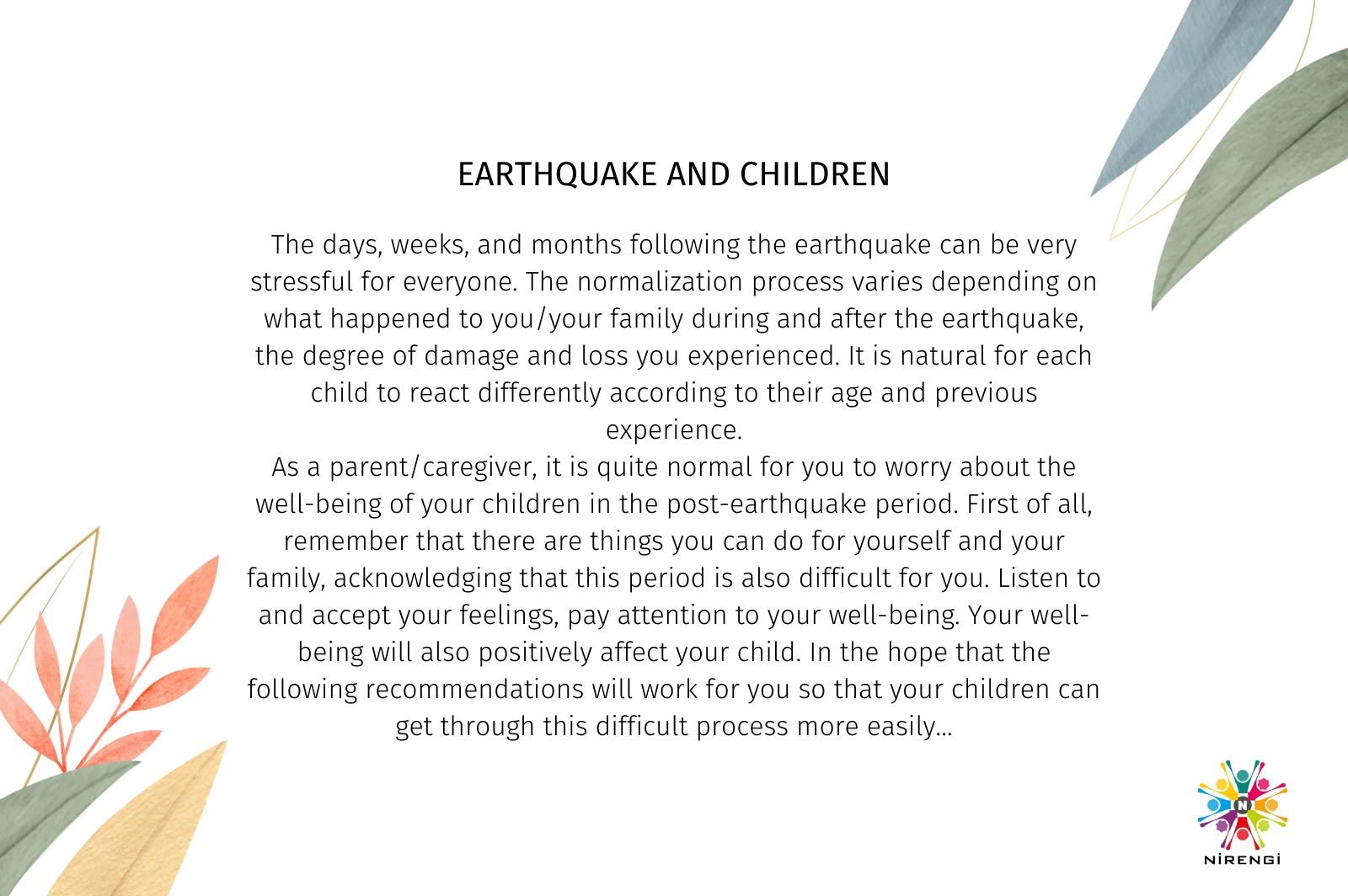EARTHQUAKE AND CHILDREN
The days, weeks, and months following the earthquake can be very stressful for everyone. The normalization process varies depending on what happened to you/your family during and after the earthquake, the degree of damage and loss you experienced. It is natural for each child to react differently according to their age and previous experience.
As a parent/caregiver, it is quite normal for you to worry about the well-being of your children in the post-earthquake period. First of all, remember that there are things you can do for yourself and your family, acknowledging that this period is also difficult for you. Listen to and accept your feelings, pay attention to your well-being. Your well-being will also positively affect your child. In the hope that the following recommendations will work for you so that your children can get through this difficult process more easily…
Things I Can Do for My Child
Take the time to talk about what happened. Send a message to children that it’s ok for them to ask questions and express their concerns. Be open to answering new questions. Answer questions briefly and honestly, correct the misinformation they hear but also ask your child for their ideas and opinions.
Do activities. Expressing what he has experienced, what he feels in pictures, reflecting on games, engaging in physical activities, breathing exercises will help reduce his anxiety. It might be useful to paint an earthquake, throw away the paper, step on it, tear it up. You can chat about the earthquake with a story that your child likes. This will make them feel more comfortable and safe.
Be a role model. Changes in living conditions can be extremely stressful for children. Parents/ caregivers’ reactions to events are a guide for children. Therefore, parents/caregivers’ awareness of their concerns and ability to manage their emotions in stressful situations will provide a role model for children in a good way. Accepting and expressing emotions is also part of good guidance, not pretending it never happened.
Help children feel safe. During an aftershock, show the children what to do and repeat at regular intervals. Knowing the measures they can implement will make them feel they have control over the incident and help reduce their concerns.
Keep the routines going. Children feel more comfortable and safe when they have routines and rules. Stick to daily routines as much as possible (meal times, bedtime, etc.).
Prevent exposure to earthquake news. Prevent children from being exposed to earthquake news broadcast in newspapers, the internet, radio, and television after an earthquake. This news could trigger trauma for them. In particular, young children may not understand that the media is showing images of destroyed buildings again and may think it is a new earthquake.
Address your friends’ concerns about your safety. Since it can be difficult to contact or meet friends, comfort your children by telling them that they are safe and well with their families, just as he is safe and well with you.
Support at bedtime. Children may feel anxious, especially during bedtime, when they leave their parents/caregivers. In the meantime, spend more time at bedtime on activities such as reading stories with your children.
Keep adult conversations under control. Be aware of what is said in the conversations about the earthquake. Children can misinterpret what they hear and be unnecessarily horrified about things they can’t make sense of.
Get professional help. If your child’s emotional responses persist for more than 4-6 weeks with serious functional disorders, get support from a specialist.
Be hopeful. Try to stay hopeful for the future. An optimistic outlook helps children see the beautiful things in the world and around them.
Reference: The National Child Traumatic Stress Network. (2007). Parent Guidelines for Helping Children after an Earthquake. https://www.nctsn.org/sites/default/files/resources//parents_guidelines_for_helping_children_after_an_earthquake.pdf














